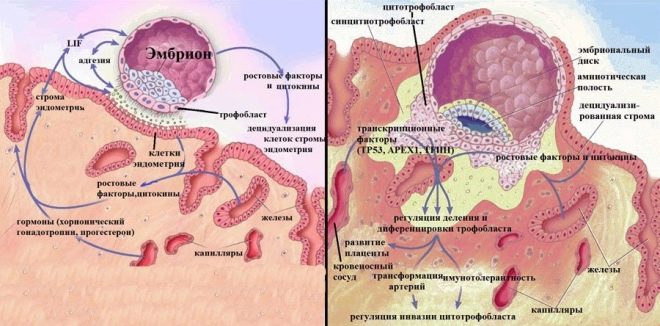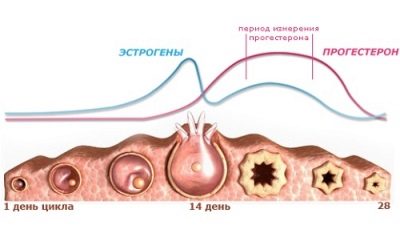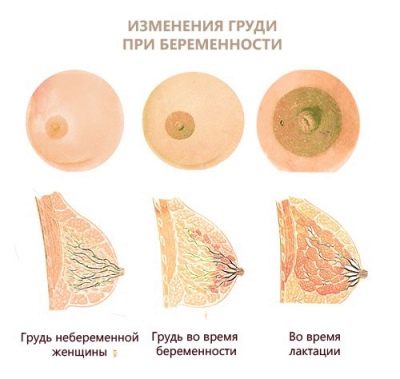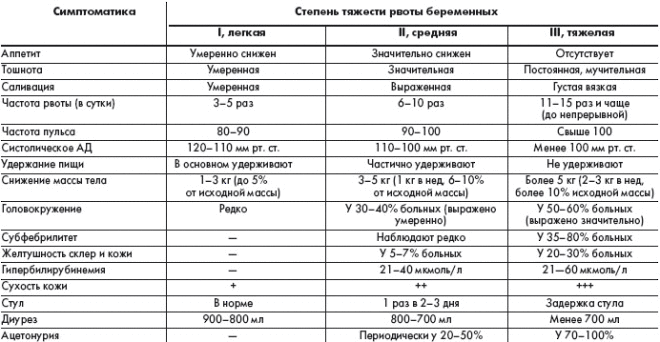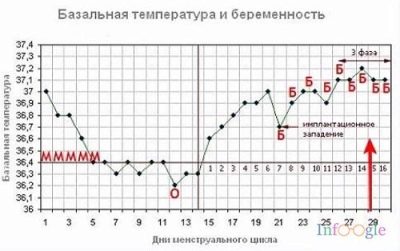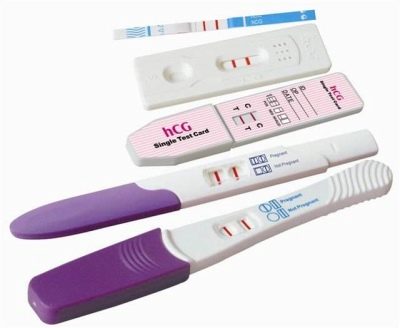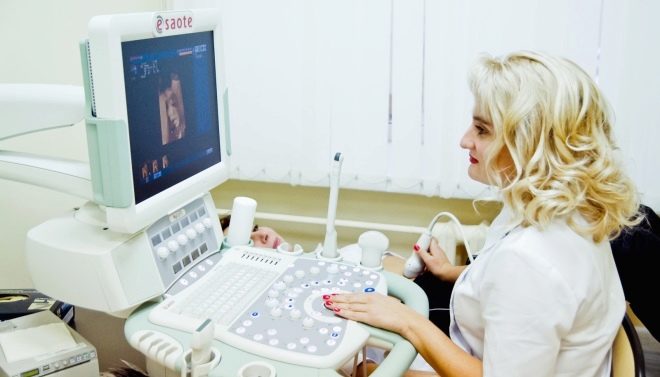The first signs of pregnancy after IVF
The IVF protocol ends with the transfer of embryos into the uterine cavity of a woman. The efforts of the doctors end there, and for the woman a completely new stage of life begins - the expectation of signs of a coming pregnancy. Many have high hopes for assisted reproductive technologies, and therefore they are inclined to see signs of pregnancy in any change in well-being after embryo transfer. What can indicate the success of the protocol, we will tell in this article.
When can symptoms appear?
After IVF, signs of pregnancy may appear somewhat later than after natural conception. This is due to the fact that the implantation (embryo insertion into the endometrium) takes much more time. An embryo conceived naturally, under favorable conditions, is implanted approximately 8 days after conception. The process of introducing the ovum into the functional layer of the uterus takes about 40 hours.
The embryo obtained in the laboratory is transferred to the uterine cavity during the so-called implantation window. The beginning of implantation can occur both in a few hours, and in 3-6 days after the transfer, the process of implantation takes from three days.
The first signs that may indicate pregnancy may physiologically manifest only after successful implantation, since before it pregnancy is not considered to have occurred and the body does not perceive the embryo as part of itself. Therefore, it is too early to expect symptoms indicating the onset of a long-awaited “interesting position”, it is not worth it.
As a result of a successful protocol, the symptoms of pregnancy may begin to appear no earlier than 6-7 days after embryo transfer. It is possible that the signs will not appear until 14-16 days after transplantation. If transferred three-day embryos, signs of pregnancy will appear later by about 3-4 days than after the transfer of five days.
All signs before the delay and diagnosis are considered subjective and can not serve as a basis for stating the fact of pregnancy, but it is they that cause the most questions for women, so let's consider them in more detail.
First signs
After collecting eggs, in most cases, women are recommended to take progesterone preparations, which should create more favorable conditions for embryo transfer - the endometrium should become more loose and thick. Against the background of progesterone therapy, the sensations of the woman are about the same as in the second phase of the natural cycle.
After implantation, if it is successful, after a few days, certain changes in the condition of the woman may occur. Immediately make a reservation that they are only possible, but are not mandatory and indispensable. For many women, none of the following is observed. The majority may show 1-2 signs, but not the whole list.
Chest
Some women who are particularly sensitive, note that a change in the state of the mammary glands is the first sign. Hormonal background, which has changed after implantation, implies enhanced production of progesterone and prolactin, which causes the growth of glandular breast tissue and its slight increase in size. There may be soreness and increased nipple sensitivity.
This symptom is among the first to occur in approximately 30% of women. The rest note that nothing unusual happened with the breast or it was surprisingly soft and painless, although usually it is a little painful for menstruation. It is this “strange” behavior of the mammary glands that can serve as a symptom, but you shouldn’t rely too much on it if long-term hormonal stimulation preceded embryo-transfer — in this case, the breast may be painful and sensitive, and also slightly increased due to residual hormonal background ovarian stimulation.
Sensations in the stomach
Something to feel in the abdomen at least early. After in vitro fertilization, a woman may well experience a heaviness and a feeling of bloating in the abdomen. This is due to the increase in ovaries in size after stimulation of superovulation. A sign of pregnancy is not considered.
It is impossible to feel the implantation, but some women note that a tingling sensation in the uterus region was observed in the successful IVF protocol a week after the embryo transfer. Such sensations can be caused by previous hormonal stimulation, and can also be a sign of increased blood circulation in the uterus in case of successful implantation.
Small tingling in the uterus is a consequence of the softening of the uterine ligaments and muscles of the reproductive organ, as progesterone acts. And it is absolutely not necessary that the pregnancy has come.
Toxicosis
Signs of toxicosis after IVF should not be expected early. Any toxicosis is essentially a response of the immune system to the fetus and changes in the functioning of all organs and systems associated with the onset of pregnancy. For many women, toxicity is not observed at all, and this is also not unusual.
Most often, signs of toxicosis appear at 6-8 weeks of pregnancy and gradually recede by 12-14 weeks, when the placenta is finally formed. In rare cases, in women with high immunity, toxicosis begins earlier - even before the delay of menstruation. This is usually manifested by nausea, intolerance to some well-defined smells and tastes.
Psychological state
One of the side effects of progesterone in a woman’s body is psychological and emotional instability, to which the expectant mother can be exposed only a few days after the implantation. The concentration of progesterone is increasing, it is manifested by sleep disorders. Approximately 8–9 days after embryo transfer, a woman may notice that it has become more difficult to fall asleep, to wake up more often, or, conversely, constantly wants to sleep.
The mood can change quite quickly - from tears to laughter and vice versa. A woman may experience causeless anxiety, fear, apathy. The peculiarity lies in the fact that the state and mood of this is not long, it is quickly replaced by another.
Allotment
After a rather aggressive hormone therapy, which was conducted at the beginning of the IVF protocol, pink, bloody, spotting is considered to be completely normal in early pregnancy after IVF. Within 14 days after embryo transfer, they won't surprise anyone at all. However, the discharge can be normal, light and slightly thickish.
In the second case, the woman is more likely to notice some signs of implantation, if they appear. It is about implant bleeding.
When the integrity of the endometrium of the uterus is impaired when a fetal egg is inserted into it, there may be slight bleeding that is not abundant and does not last more than a day. It should be noted that implant bleeding occurs infrequently, and therefore it is not necessary to rely on such a symptom initially. In addition, the accomplished implantation does not mean that the fetus will develop normally, and the pregnancy will continue.Sometimes the embryo stops development immediately after implantation, in which case the pregnancy will not be diagnosed.
The appearance of heavy bleeding on any day after embryo transfer is a warning sign that requires a mandatory examination by a doctor. Most often, it has nothing to do with a possible pregnancy.
Basal temperature
Basal temperature measurement is not very reasonable after IVF protocol. If the pregnancy occurs naturally, after fertilization, the temperature remains elevated, and this indicates a possible conception. After IVF, the basal temperature can be increased already because the woman has undergone hormone therapy, follicle puncture, and also continues to take progesterone after embryo-transfer.
Therefore, basal temperature measurement makes sense only if a woman has long-term observations of her temperature over several cycles in which no hormones have been taken, and IVF was performed in a natural cycle without medication support.
Other signs
Among the early signs are mainly the symptoms that causes a changed hormonal background. Progesterone causes a decrease in the immunity of women, and this statement is true for 100% of those who become pregnant. Therefore, after implantation or a little later, a woman may feel that she suddenly became ill - a low temperature will rise (about 37.0 degrees or a little higher), a runny nose and cough, headaches may appear. All these symptoms cause not only viruses and hypothermia, but also an important pregnancy hormone - progesterone.
If a woman has not been in places of mass congestion, has not been in contact with the diseased, has not supercooled, fever and mild runny nose can theoretically be regarded as a sign of early pregnancy.
Quite often there is frequent urination. It may occur within a few days after implantation. A rather exotic feature is the sign of increased salivation. A woman may notice that the edge of the pillow is wet from saliva after sleep.
Saliva is often produced in quantities greater than necessary, due to changes in the work of the cerebral cortex, where a new temporary center, the center of pregnancy, has appeared since implantation. He begins to "conflict" with the neighboring areas of the brain, in particular, with the center responsible for regulating the production of saliva.
Reliable diagnostics
Diagnostics after successful IVF has its own characteristics. Pharmacy test strips are not recommended for women after the IVF protocol, because they detect hCG in the urine, and in the middle of the cycle, the woman experienced the introduction of hCG preparations for faster maturation of the eggs before their extraction with punctuation.
The level of hCG may be elevated and out of pregnancy, and therefore doctors give clear recommendations - to do a blood test for hCG (not urine) only 14 days after embryo transfer.
A week later, on the 21st day after the transfer of embryos to the uterus, the first ultrasound scan can be done, which will put an end to the question whether the IVF attempt was successful. If not, then progesterone drugs are canceled, after a few days menstruation occurs. At the end of the menstruation, the woman can turn to a reproductologist to plan and determine the dates for the next attempt.
Reviews
Reviews of the first signs after embryo transfer are quite diverse. In addition to those listed above, there are also quite exotic ones - a woman begins to yawn often, as if she lacks oxygen, or constantly wants to stretch herself, although this has not been observed before.
Often, women note increased fatigue, even light homework causes heart palpitations and a desire to lie down and rest.
Many signs are not observed at all. And this is considered normal. Many doctors tend to believe that the early signs and symptoms of women come up with themselves, because they really want to get pregnant.
Read more about the first signs of pregnancy in the next video.

